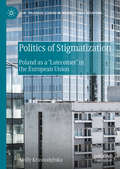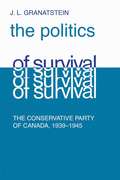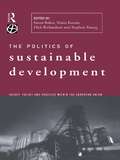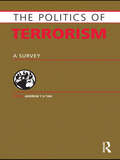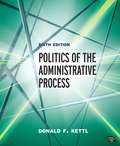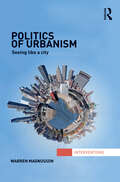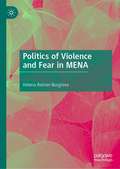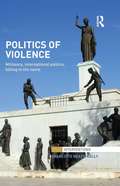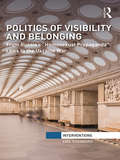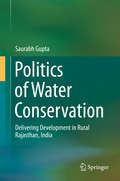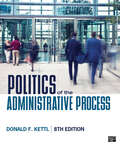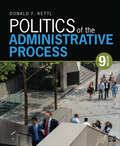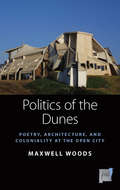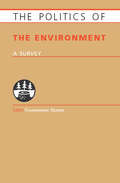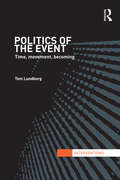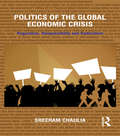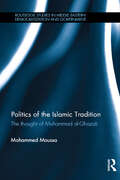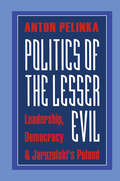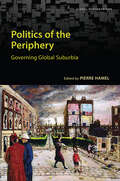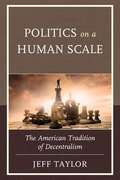- Table View
- List View
Politics of Stigmatization: Poland as a ‘Latecomer’ in the European Union (Palgrave Studies in International Relations)
by Molly KrasnodębskaThis book studies how the pursuit of becoming an established ‘insider’ in an international community shapes a state’s foreign policy. It looks at Poland’s response to three international crises that called for joint action of the EU and its members: the Iraq war of 2003, the Russo-Georgian war of 2008, and the Ukraine crisis beginning in 2013. The book develops the concept of strategic culture as a collection of historically informed narratives that guide a state’s pursuit of ontological security, a basic sense of certainty about the state’s role and place in the international environment. Building on this concept the author argues that Poland’s behavior reflects the awareness of its stigma as a ‘late arrival’ in the EU, and more generally in the ‘West’ as an identity community. The study thus provides insight into how stigmatization and struggle for recognition shape international dynamics.
Politics of Survival: The Conservative Part of Canada, 1939-1945 (The Royal Society of Canada Special Publications)
by J. L. GranatsteinProfessor Granatstrin's book is a fascinating account of the Conservative party's struggle for survival during the Second World War. In some respects a new departure in Canadian history and with some startling parallels to present-day events and personalities in Canadian politics, it is the first full-length look at a major party during a critical period of our history. Lively writing and a wealth of documentation that has only recently become available help to make it one of the most interesting studies to be published in this field.
Politics of Sustainable Development: Theory, Policy And Practice Within The European Union
by Stephen Young Susan Baker Maria Kousis Dick RichardsonThe concept of sustainable development was popularised by the 1987 Brundtland Report and became a central theme in the EU's Fifth Environmental Action Programme. It dominated the Rio Earth Summit and its promotion has been much in evidence in the subseque
Politics of Terrorism: A Survey
by Andrew T H TanTerrorism is increasingly at the forefront of political agendas. Events world-wide have led to an increased awareness and response to this global phenomenon. The focus of this volume is on examining the fundamental causes of alienation and rebellion that underlie the use of terrorism as an instrument of violence. This title includes: essays, each of around 8,000 words in length, providing in-depth analysis of topics of relevance in the subject an A-Z glossary of key terrorist groups and organizations, as well as major terrorist incidences and events detailed maps and statistics an extensive bibliography listing further relevant reading material. This unique combination of analytically detailed essays with statistics and a glossary make this title a unique one-stop reference source as well as a training and education guide on the politics of terrorism world-wide.
Politics of The Administrative Process
by Donald F. KettlThoroughly updated with new scholarship, data, and events, this text remains reader-friendly with its engaging opening vignettes and rich examples--told only the way prolific author and columnist Don Kettl can. With three case studies in every chapter, students apply ideas and analysis as they read. Useful critical thinking questions at the end of each case help shape student responses and in-class conversation.
Politics of Urbanism: Seeing Like a City (Interventions)
by Warren MagnussonTo see like a city, rather than seeing like a state, is the key to understanding modern politics. In this book, Magnusson draws from theorists such as Weber, Wirth, Hayek, Jacobs, Sennett, and Foucault to articulate some of the ideas that we need to make sense of the city as a form of political order. Locally and globally, the city exists by virtue of complicated patterns of government and self-government, prompted by proximate diversity. A multiplicity of authorities in different registers is typical. Sovereignty, although often claimed, is infinitely deferred. What emerges by virtue of self-organization is not susceptible to control by any central authority, and so we are impelled to engage politically in a world that does not match our expectations of sovereignty. How then are we are to engage realistically and creatively? We have to begin from where we are if we are to understand the possibilities. Building on traditions of political and urban theory in order to advance a new interpretation of the role of cities/urbanism in contemporary political life, this work will be of great interest to scholars of political theory and urban theory, international relations theory and international relations.
Politics of Violence and Fear in MENA
by Helena Reimer-Burgrova‘Politics of Violence and Fear in MENA: The Case of Egypt’ explores the state-orchestrated violence in Egypt, Syria, and Turkey justified by vaguely defined terrorist threats. It analyses the “wars on terror” as cases of lengthy securitisation processes that reinforced and legitimised autocratic practices of oppression in each country. Paying particular attention to Egypt’s “war on terror” that began 1981, the book looks into how and with what implications such securitisation processes are upheld throughout lengthy periods of time. Reworking the traditional securitisation theory, this book offers a novel securitisation model (the TER-model) that addresses the questions of securitisation durability and is applicable in non-liberal empirical contexts. The monograph is ideal for graduate students, researchers and policy makers in the fields of political science, International Relations, and Middle Eastern Studies.
Politics of Violence: Militancy, International Politics, Killing in the name (Interventions)
by Charlotte Heath-KellyCritical thinkers like Foucault, Benjamin, Derrida and Žižek have long challenged the liberal separation of violence and politics by highlighting the implicit violence within political and economic structures. But in an era of international terrorism and counter-terrorism, should we not also reverse the question to ask ‘what is political about violence?’ Using interviews with ex-militants from Italian leftist struggle of the 1970s and the Cypriot anti-colonial militancy of the 1950s, Heath-Kelly explores the political utility of violence. Studies of conflict and international politics rarely address how killing and injuring function to win wars or overturn regimes. But by rejecting conceptions of violence as a means-to-an-end found in the works of Clausewitz and Arendt, this book draws upon studies of pain to explore the ways in which armed struggle produces new political subjects and regimes, and discredits others, through experiences of violence. Using Elaine Scarry’s conception of pain as ‘world-destroying’ and Walter Benjamin’s delineation of violence as either lawmaking or law-preserving to frame ex-militant discussions of participation in armed struggle, the book contributes a pathbreaking empirical exploration of violence to international politics literatures - moving the study of political violence away from an understanding of violence as just a means-to-an-end. Drawing out insights that have a far wider resonance and significance for the analysis of the ‘politicality’ of political violence, this work will be of interest to students and scholars in areas such as international relations, security studies and international relations theory.
Politics of Visibility and Belonging: From Russia´s “Homosexual Propaganda” Laws to the Ukraine War (Interventions)
by Emil EdenborgIn this book, Edenborg studies contemporary conflicts of community as enacted in Russian media, from the ‘homosexual propaganda’ laws to the Sochi Olympics and the Ukraine war, and explores the role of visibility in the production and contestation of belonging to a political community. The book examines what it is that determines which subjects and narratives become visible and which are occluded in public spheres; how they are seen and made intelligible; and how those processes are involved in the imagination of communities. Investigating the differentiated consequences of visibility, Edenborg discusses what forms of visibility make belonging possible and what forms of visibility may be related to exclusion or violence. The book maps and analyses the practices and mechanisms whereby a state seeks to produce and shape belonging through controlling what becomes visible in public, and how that which becomes visible is seen and understood. In addition, it examines what forms contestation can take and what its effects may be. Advancing theoretical understanding and offering a useful way to analytically conceptualize the role of visibility in the production and contestation of political communities, this work will be of interest to students and scholars of gender and sexuality politics, borders, citizenship, nationalism, migration and ethnic relations.
Politics of Water Conservation
by Saurabh GuptaThis book examines the politics of rural development with special reference to watershed development interventions in the desert province of Rajasthan in India. Watershed development (and rainwater harvesting) is one of the most significant rural development interventions in rainfed areas of India since the early 1990s. A range of developmental actors including the state watershed department, international donors, NGOs and grassroots organisations are involved in sponsoring watershed development projects. Using multi-sited ethnography and conversational interviews with the deliverers as well as recipients of development, the book compares and contrasts the watershed interventions of the state and two different kinds of NGOs in Rajasthan. While conventional studies on watershed development have focused on the evaluation of 'success' or 'failure' of particular projects, whether implemented by the state or NGOs, the book moves beyond this narrow analytical gaze to look at the roles, agendas and interests of multiple development agencies, often partnering together and sometimes competing with each other as part of, what the author calls, the 'watershed development regime'. Taking cue from watershed development and water conservation projects over the last two decades, the book engages with the larger question of 'how' of delivering development. It examines the complex processes of cooperation, competition, negotiations, contestations and conflicts between different stakeholders, including the agents of development and differently positioned rural social groups in the context of Rajasthan. The book demonstrates that the recent interventions in watershed development and rainwater harvesting have considerably shaped the politics of development in Rajasthan in a number of ways: by becoming a site for the remaking of the 'state' and its internal relations, by disturbing the local hegemony in the countryside, by creating new relations of patronage between diverse agents and recipients of development, by increasing the associational capacity as well as creating new conflicts (intra and inter village) and by initiating competition and cooperation between the various agents of development over control of local resources and power.
Politics of a Guaranteed Income: The Nixon Administration and the Family Assistance Plan
by Daniel P. MoynihanA prominent Democrat discusses The Nixon Administration and the Family Assistance Plan.
Politics of the Administrative Process
by Donald F. KettlPolitics of the Administrative Process shows how efficient public administration requires a delicate balance—the bureaucracy must be powerful enough to be effective, but also accountable to elected officials and citizens. Author Don Kettl gives students a realistic, relevant, and well-researched view of the field in this reader–friendly best seller. With its engaging vignettes, rich examples and a unique focus on policymaking and politics, the Seventh Edition continues its strong emphasis on politics, accountability, and performance. This new edition has been thoroughly updated with new scholarship, data, events, and case studies, giving students multiple opportunities to apply ideas and analysis as they read.
Politics of the Administrative Process
by Donald F. KettlPolitics of the Administrative Process shows how efficient public administration requires a delicate balance—the bureaucracy must be powerful enough to be effective, but also accountable to elected officials and citizens. Author Don Kettl gives students a realistic, relevant, and well-researched view of the field in this reader–friendly best seller. With its engaging vignettes, rich examples and a unique focus on policymaking and politics, the Seventh Edition continues its strong emphasis on politics, accountability, and performance. This new edition has been thoroughly updated with new scholarship, data, events, and case studies, giving students multiple opportunities to apply ideas and analysis as they read.
Politics of the Administrative Process
by Donald F. KettlEfficient public administration requires a delicate balance—the bureaucracy must be powerful enough to be effective, but also accountable to elected officials and citizens. Donald F. Kettl understands that the push and pull of political forces in a democracy make the functions of bureaucracy contentious, but no less crucial. Politics of the Administrative Process gives students a realistic, relevant, and well-researched view of the field while remaining reader-friendly with engaging vignettes and rich examples. With a unique focus on policymaking and politics, the Eighth Edition continues its strong emphasis on politics, accountability, and performance.
Politics of the Administrative Process
by Donald F. KettlEfficient public administration requires a delicate balance—the bureaucracy must be powerful enough to be effective, but also accountable to elected officials and citizens. Donald F. Kettl understands that the push and pull of political forces in a democracy make the functions of bureaucracy contentious, but no less crucial. Politics of the Administrative Process gives students a realistic, relevant, and well-researched view of the field while remaining reader-friendly with engaging vignettes and rich examples. With a unique focus on policymaking and politics, the Eighth Edition continues its strong emphasis on politics, accountability, and performance.
Politics of the Administrative Process
by Donald F. KettlEfficient public administration requires a delicate balance between politics, accountability, and performance--bureaucracy must be powerful enough to be effective but also accountable to elected officials and citizens. Author Don Kettl understands that the push and pull of political forces in a democracy make the functions of bureaucracy both contentious and crucial. In The Politics of the Administrative Process, he gives students a realistic, relevant, and well-researched view of the field featuring engaging vignettes and rich examples from current events like the COVID-19 pandemic. The Ninth Edition has been thoroughly updated with an additional chapter, as well as new scholarship, data, and case studies, giving students multiple opportunities to apply ideas and analysis as they read.
Politics of the Administrative Process
by Donald F. KettlEfficient public administration requires a delicate balance between politics, accountability, and performance--bureaucracy must be powerful enough to be effective but also accountable to elected officials and citizens. Author Don Kettl understands that the push and pull of political forces in a democracy make the functions of bureaucracy both contentious and crucial. In The Politics of the Administrative Process, he gives students a realistic, relevant, and well-researched view of the field featuring engaging vignettes and rich examples from current events like the COVID-19 pandemic. The Ninth Edition has been thoroughly updated with an additional chapter, as well as new scholarship, data, and case studies, giving students multiple opportunities to apply ideas and analysis as they read.
Politics of the Dunes: Poetry, Architecture, and Coloniality at the Open City (Space and Place #19)
by Maxwell WoodsFounded in the late 1960s on Chile’s Pacific coast, the Open City (la Ciudad Abierta) has become an internationally recognized site of cutting-edge architectural experimentation. Yet with a global reputation as an apolitical collective, little has been discussed about the Open City’s relationship with Chilean history and politics. Politics of the Dunes explores the ways in which the Open City’s architectural and urban practice is devoted to keeping open the utopian possibility for multiplicity, pluralism, and democratization in the face of authoritarianism, a powerful mode of postcolonial environmental urbanism that can inform architectural practices today.
Politics of the Environment: A Survey
by Chukwumerije OkerekeThe environment is increasingly seen at the forefront of many political agendas. Covering important topics, such as the Kyoto protocol and deforestation, this book provides extensive coverage of all aspects of environmental politics. Essays of around 6,000 words in length make up the bulk of the book. Written by notable experts in the field of environmental politics, these essays each examine a different aspect of the subject.
Politics of the Event: Time, Movement, Becoming (Interventions)
by Tom LundborgDespite occupying a central role and frequently being used in the study of international politics, the concept of the "event" remains in many ways unchallenged and unexplored. By combining the philosophy of Gilles Deleuze and his concept of the event with the example of 9/11 as an historical event, this book problematises the role and meaning of "events" in international politics. Lundborg seeks to demonstrate how the historical event can be analysed as a practice of inscribing temporal borders and distinctions. Specifically he shows how this practice relies upon an ongoing process of capturing various movements – of thought, sense, experience and becoming. However the book also demonstrates how these same movements express a life and reality that elude complete capture, highlighting the potential for alternative encounters with the event, encounters that constantly threaten to undermine the limits and imaginary completeness of the historical event. This book offers an exciting new way of thinking about the politics of encountering events, arguing that at the heart of such encounters there are always elements of uncertainty and contingency that cannot be fully resolved or fixed. It will be of great interest to students and scholars of international relations, cultural studies and history.
Politics of the Global Economic Crisis: Regulation, Responsibility and Radicalism
by Sreeram ChauliaA crucial commentary on the worst global economic crisis since the Great Depression, this book argues for ‘Three Rs’ — Regulation, Responsibility and Radicalism — i.e., state regulation of finance, state responsibility towards society, and radical social movements to fight for economic justice. It will interest scholars and researchers in international political economy, politics, international relations, and economics, as also policymakers and the informed general reader.
Politics of the Islamic Tradition: The Thought of Muhammad Al-Ghazali (Routledge Studies in Middle Eastern Democratization and Government)
by Mohammed MoussaOver the last two centuries the Muslim world has undergone dramatic transformations, impacting the Islamic tradition and throwing into question our understanding of tradition. The notion of tradition as an unmoving edifice is contradicted by the very process of its transmission, and the complex role human beings play in creating and sustaining traditions is evident in the indigenous mechanisms of change within the Islamic tradition. Politics of the Islamic Tradition locates the work of Egyptian cleric Muhammad al-Ghazali within the context of this dynamic Islamic tradition, with special focus on his political thought. Al-Ghazali inherited a vast and diverse heritage which he managed to reinterpret in a changing world. An innovative exploration of the change and continuity present within Muslim discourses, this book brings together disparate threads of the Islamic tradition, religious exegesis, the contemporary Arab Middle East, the Islamic state and idea of renewal in al-Ghazali’s thought. As well as being one of the first complete treatments of al-Ghazali’s works, this book provides an original critical approach to tradition and its capability for innovation and change, countering the dichotomy between tradition and modernity that typically informs most scholarly studies on contemporary Islam. Offering highly original insights into Islamic thought and engaging with critical notions of tradition, this book is essential reading for students and scholars of Islamic Politics and History.
Politics of the Lesser Evil
by Anton PelinkaIn his pathbreaking book, Leadership, James MacGregor Burns defines a kind of leadership with an indistinguishable personal impact on society. He calls this "transformal" leadership, and sees it as more than routine and calculable responses to demands. In fact, he argues, the more stable a liberal democracy, the less freedom of action for transformal leadership. Anton Pelinka uses a wellspring of historical fact to argue that politics always means having to choose between the lesser of two evils and that democracy reduces any possibility of personal leadership.According to Pelinka, Jaruzelski's politics of democratization in Poland in the 1980s (which led to the first free and competitive elections in a communist system) illustrate personal leadership hampered by democracy. Jaruzelski initiated the roundtable process that transformed Poland into a democracy; yet, this process ultimately ended with his abdication. Pelinka further emphasizes contradictions between transformal leadership and democracy by comparing the leadership styles of Hitler, Stalin, and Mao. He de-.scribes collaboration, resistance, and tensions between domestic and international leadership, using the American examples of Presidents Wilson, Roosevelt, Kennedy, Johnson, and Nixon and the European examples of Petain and Churchill. Pelinka then turns to the tragic fate of the Judenrate under the Nazi regime to illustrate the "lesser-evil" approach. He closes with a discussion of "moral leadership" and how abstaining from office, just as Gandhi and King did, may be particularly suited to stable democracies.Pelinka's unique use of rich empirical evidence from twentieth-century history is this volume's hallmark. He is critical of mainstream political theory and its neglect of deviant examples of democracies - such as Switzerland, Italy, and Japan, where there is traditionally much less emphasis placed on leadership. Pelinka's noteworthy study will be essential reading for political scientists and theorists, political philosophers and political sociologists with special interest in political ethics, and contemporary historians.
Politics of the Periphery: Governing Global Suburbia (Global Suburbanisms)
by Pierre HamelNew urban forms characterizing contemporary metropolises reflect a certain continuity with the patterns of the past. They also include unexpected forms of settlement and design that have emerged in response to social and economic needs and as a way of leveraging new technologies. Politics of the Periphery sets out to explore sub/urban governance in diverse contexts in order to better understand how materiality and space are shaped by the possibilities and constraints of confronting actors. This collection, edited by Pierre Hamel, examines the empirical aspects of collective action and planning in eight urban regions around the world – across North America, Europe, Asia, and Africa – and reveals the impacts and consequences of various structures of suburban governance. The case studies feature a diverse range of local actors facing both the specificity of their respective milieus and the broader context of extended urbanization as metropolitan regions cope with new territorial challenges. The book focuses on suburbanization processes that characterize most of these post-metropolitan regions and questions whether it is possible to improve suburban governance in the face of growing uncertainties arising from structural and subjective transformations. Paying close attention to the relationship between the local and the global, Politics of the Periphery challenges the planning processes of evolving metropolitan regions.
Politics on a Human Scale: The American Tradition of Decentralism
by Jeff TaylorThis is a book about political decentralization in the United States. It is one part national history, one part social commentary, one part political theory, and one part applied theology. Politics on a Human Scale covers the subject with breadth and depth. Academic jargon is kept to a minimum, terms are defined, and specific examples are given.
